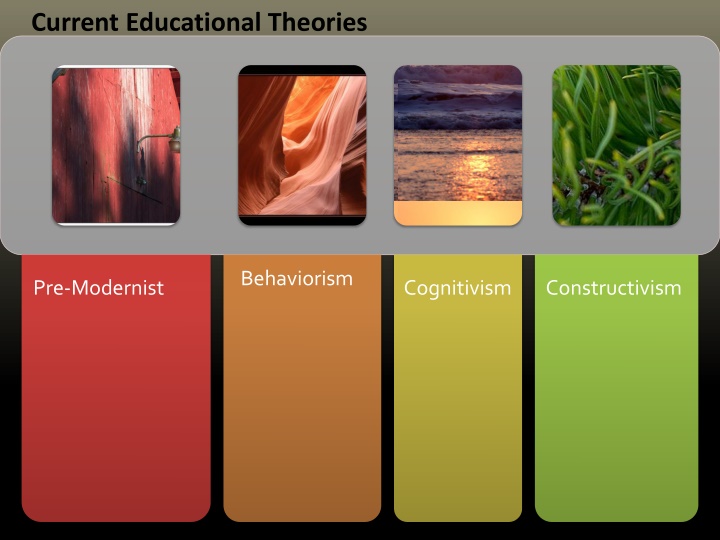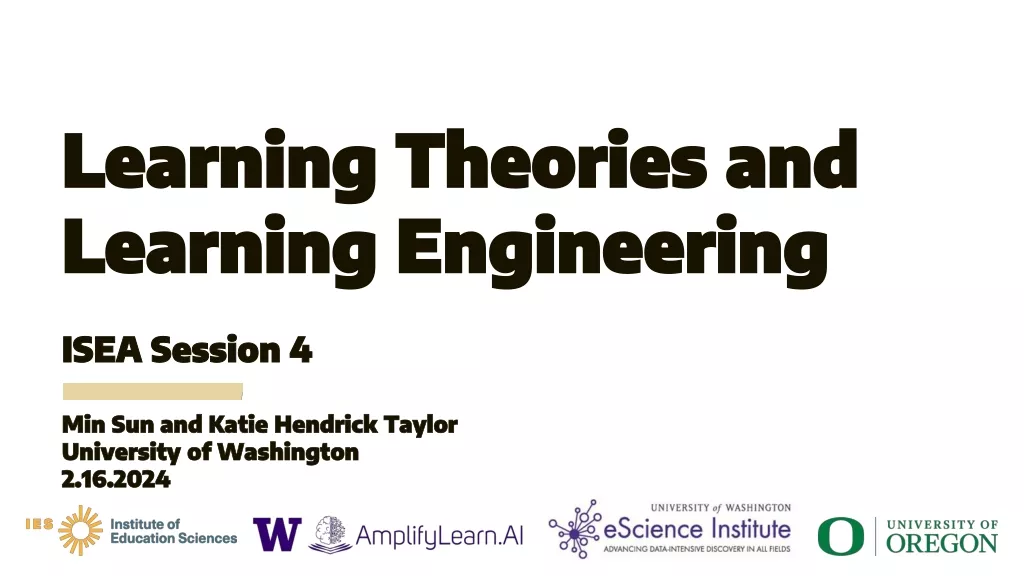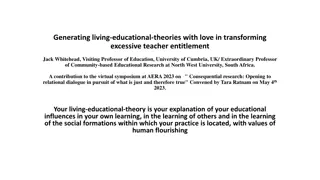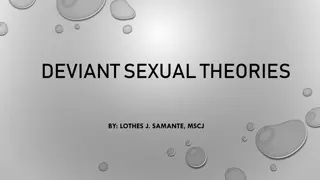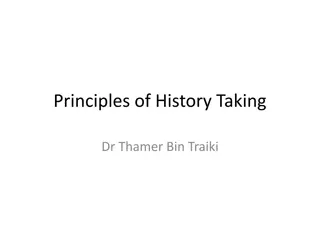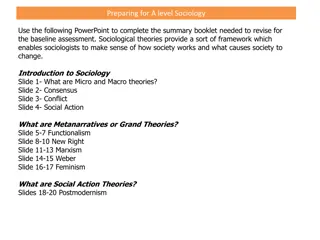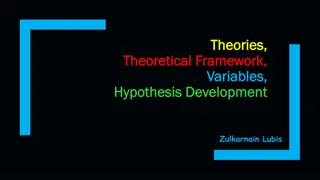Overview of Current Educational Theories and History
Behaviorism, cognitivism, constructivism, and historical educational theories like Anti-educationism, Democratic Calvinism. Delve into the strengths and weaknesses of behaviorism, the principles of constructivism, and Reconstructionism. Social Reconstruction and Reconstructionism's impact on society, focusing on the educational philosophies of John Dewey and Lev Vigotsky. Pragmatism and Constructivist approaches inspired by Dewey's ideas.
Download Presentation

Please find below an Image/Link to download the presentation.
The content on the website is provided AS IS for your information and personal use only. It may not be sold, licensed, or shared on other websites without obtaining consent from the author.If you encounter any issues during the download, it is possible that the publisher has removed the file from their server.
You are allowed to download the files provided on this website for personal or commercial use, subject to the condition that they are used lawfully. All files are the property of their respective owners.
The content on the website is provided AS IS for your information and personal use only. It may not be sold, licensed, or shared on other websites without obtaining consent from the author.
E N D
Presentation Transcript
Current Educational Theories Behaviorism Pre-Modernist Cognitivism Constructivism
History of Modern Educational Theories Anti- education alism Pre- Modern Education Democratic Calvinism Elitist Education Modern Factory- style Education Puritan Foundation of Modern Educational Systems in US Jesuit Models Dark Ages of Catholicis m Remnants of Greek thinking Secularis m Emergence of Universities
Educational Theories: Cognitive Behaviorism John B Watson Cognitive Behaviorism B.F. Skinner Albert Bandura ( 74)Reciprocal Behaviorism Operant Conditioning: environment produces consequences Behaviorism: reinforcement and punishment determine human learning and behavior People learn from one another via observation, imitation and modelling Positive reinforcement Personality is interaction of environment, behavor, and psych processes Pavlov s Dogs (1928)
Strengths of Behaviorism Positive reinforcement in classroom management Works well with computer based learning Weaknesses Manipulation through social engineering Unable to deal with complex behaviours View summation of small discrete skills Embedded in sociological determinism
Educational Theories: Constructivism Marx Constructivism Derived from Pragmatism Freire (conscientization: education as a vehicle of the poor engaging oppression) Deconstructivis m (Illich) Reconstructivism John Dewey Jean Piaget Lev Vigotsky (social reconstructivism)
Reconstructionism Premise; Learners reconstruct knowledge based on their own experience and previous beliefs. This cannot be separated from a context Social Reconstruction (Lev Vigostsky). Society is in need of constant reconstruction. Such social change involves both a reconstruction of education (Illich) and the use of education in reconstructing society (Marx, Freire) Problems are viewed holistically Futuristic thinking (utopian thinking)
Pragmatism Constructivist approaches build on John Dewey (1938) Education as a way to change the environment and reflect on that change Knowledge integrates thinking and doing Learning is active Student must be involved in the creation of that knowledge
Jean Piaget The child is the subject as they try to make sense of the world through experiences The classroom is learner centered Context rich experience-based activities Work in groups where there is freedom to ask questions Teacher figures out how students learn and adapts syllsbus Assessment based on portfolio etc
Deconstructionism Former systems of belief need to be examined Their faults require rejecting them as schema The student is then ready to reconstruct Illich: Deschooling Society No hand me downs
Teachers Role in Reconstructionism Do not believe preparing students for the world as it exists today will be sufficient (too much emphasis on the status quo)
Reconstuctionist Educators: link thought with action theory with practice intellect with activism They facilitate by including opportunities for meaningful and authentic exploration, deigning actiities and utilizing group work.
Reconstructionism The goal of education should be to emphasize the need for change Students should be out in the real world World curriculum Technology is valuable in solving problems
Noted Reconstructionists Karl Marx as underlying philopsopher Ivan Illich De-schooling Society Paole Freire education as a process of conscientization for the poor John Dewey (he is also recognized as a pragmatist)
The Reconstructionist and the Chair To a reconstructionist, the redesign of the chair to better serve the needs of society is important. How can the chair be improved to prepare society for the future?
